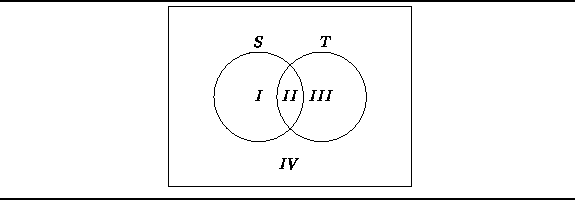In mathematics a set is a collection of elements, especially a collection having some feature or features in common. The set may have a finite number of elements, e.g., the set of prime numbers less than 100; or it may have an infinite number of elements, e.g., the set of right triangles. The elements of a set may be anything at all--from simple integers to arbitrarily complex objects. However, all the elements of a set are distinct--a set may contain only one instance of a given element.
For example, ![]() ,
, ![]() ,
, ![]() and
and ![]() are all sets
the elements of which are drawn from
are all sets
the elements of which are drawn from ![]() .
The set of all possible elements, U, is called the
universal set .
Note also that the elements comprising a given set are not ordered.
Thus,
.
The set of all possible elements, U, is called the
universal set .
Note also that the elements comprising a given set are not ordered.
Thus, ![]() and
and ![]() are the same set.
are the same set.
There are many possible operations on sets. In this chapter we consider the most common operations for combining sets--union, intersection, difference:
Figure ![]() illustrates the basic set operations using a
Venn diagram .
A Venn diagram represents the membership of sets by regions of the plane.
In Figure
illustrates the basic set operations using a
Venn diagram .
A Venn diagram represents the membership of sets by regions of the plane.
In Figure ![]() the two sets S and T divide the plane into the
four regions labeled I-IV.
The following table illustrates the basic set operations
by enumerating the regions that comprise each set.
the two sets S and T divide the plane into the
four regions labeled I-IV.
The following table illustrates the basic set operations
by enumerating the regions that comprise each set.

Figure: Venn Diagram Illustrating the Basic Set Operations